
The 1980s saw a progressive and significant decline of anti-revisionism on the left in Britain. The Maoist movement had already been much reduced in size as a result of the defection of the Communist Party of Britain (ML) to a pro-Soviet position, and the Revolutionary Communist Party or Britain (ML)’s allegiance to Albania in the late 1970s. The devotional literature of the original Hoxhaist, Bill Bland (formerly of the M.L.O.B., now of the Communist League) eventually found an outlet on the Internet.
The remaining Maoists were finally together in a single organisation – the Revolutionary Communist League of Britain (RCLB), which had ultimately succeeded in uniting five pre-existing Marxist-Leninists groups. By 1985, however, the RCLB itself was organizationally diminished and politically damaged by three major struggles over questions of political orientation as, in quick succession, leading comrades – the secretary, Chairman, and editor of its newspaper – were either expelled or left the organisation. These struggles resulted in the formation of several new groups, including the Stockport Communist Group and Mosquito Press.
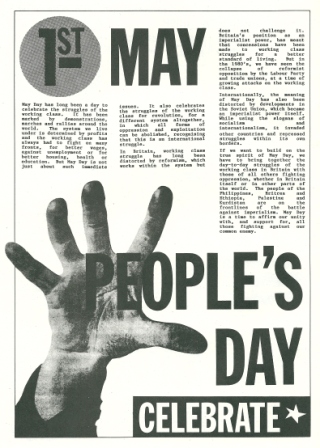
The Nottingham Communist Group sought advance, firstly with the Stockport Communist Group to ’Build the Party’. When that fell apart, there was a succession of failed attempts: the Revolutionary Internationalist Contingent and the Revolutionary Communist Union with Maoist exiles based in London. Apart from a Manifesto, ’Break the Chains!’, little was achieved by the remnants of the pro-’Gang of Four’ groups.
Generally the 1980s saw the disappearance of the small groups that populated the Maoist movement. The Working Peoples’ Party of England, ended its day (renamed in 1980) as the Workers Newsletter Group in the middle of the decade; the Communist Workers League of Britain disappeared after the last issue of Voice of the People appeared in the summer of 1981, and the Workers Party of Scotland (ML) died with its chairman Tom Murray in 1983. Mosquito Press, with its self-declared Juche allegiance, imploded despite name changes.
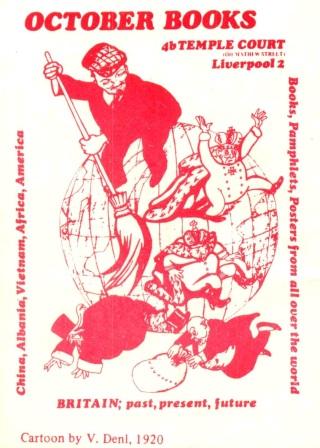
In the wake of the collapse of the Soviet Union and events in China, political compasses were discarded and historical confidence ebbed. Bland was instrumental in establishing the Stalin Society and bring together ideologically-diverse ’anti-revisionists’ from pro-Soviet, Pro-Albanian and Maoist backgrounds in what emerged as the online, Communist Party Alliance. With the collapse in Albania, The RCPB (ML) remained faithful to Hardial Bains in Canada, and came out in support of North Korea, sharing platforms with the pro-Soviet revisionist New Communist Party.
While the two-member Finsbury Communist Association survived into the new century, the largest of the Maoist groups, the RCL broke with the Communist Party of China over Tiananmen Square, produced a Political Platform in 1992 that failed to renew the organisation and eventually dissolved itself in April 1998.
Today (2011) the only overtly organised Maoists in Britain are the London-based World People’s Resistance Movement (formed in 2002) who rejected the ’New Synthesis’ of the RCPUSA to undertake independent solidarity activity with ’People’s War’ movements in Nepal and India, and the miniscule Co-Ordination Committee of Revolutionary Communists of Britain (returning full circle) as it “embarked on the preparatory stage of party building.”
| Index of organizations in this section (by alphabetical order) |
| Co-ordination Committee of Revolutionary Communists of Britain |
| Mosquito Press – Communist Organization of Scotland and England – Communist Organization of Britain |
| Revolutionary Internationalist Contingent in Britain/Revolutionary Vanguard |
The Family Tree of the Anti-Revisionist Movement in the UK [Chart]
Ebbing Tide: Maoist decline and dissolution in the 1980s by Sam Richards
Ripples: the 1990s and After by Sam Richards
The Lumpenproletariat, Riots and Revolution by Revolutionary Praxis
Mosquito Press emerged at the start of the 1980’s as a 3-person faction within the Revolutionary Communist League of Britain (RCLB) that identified with North Korea and Kim Il Sung. Involved in this faction were ’Keith Anderson’, the editor of the RCLB’s newspaper, Class Struggle, and ’Hugh Stephens’.
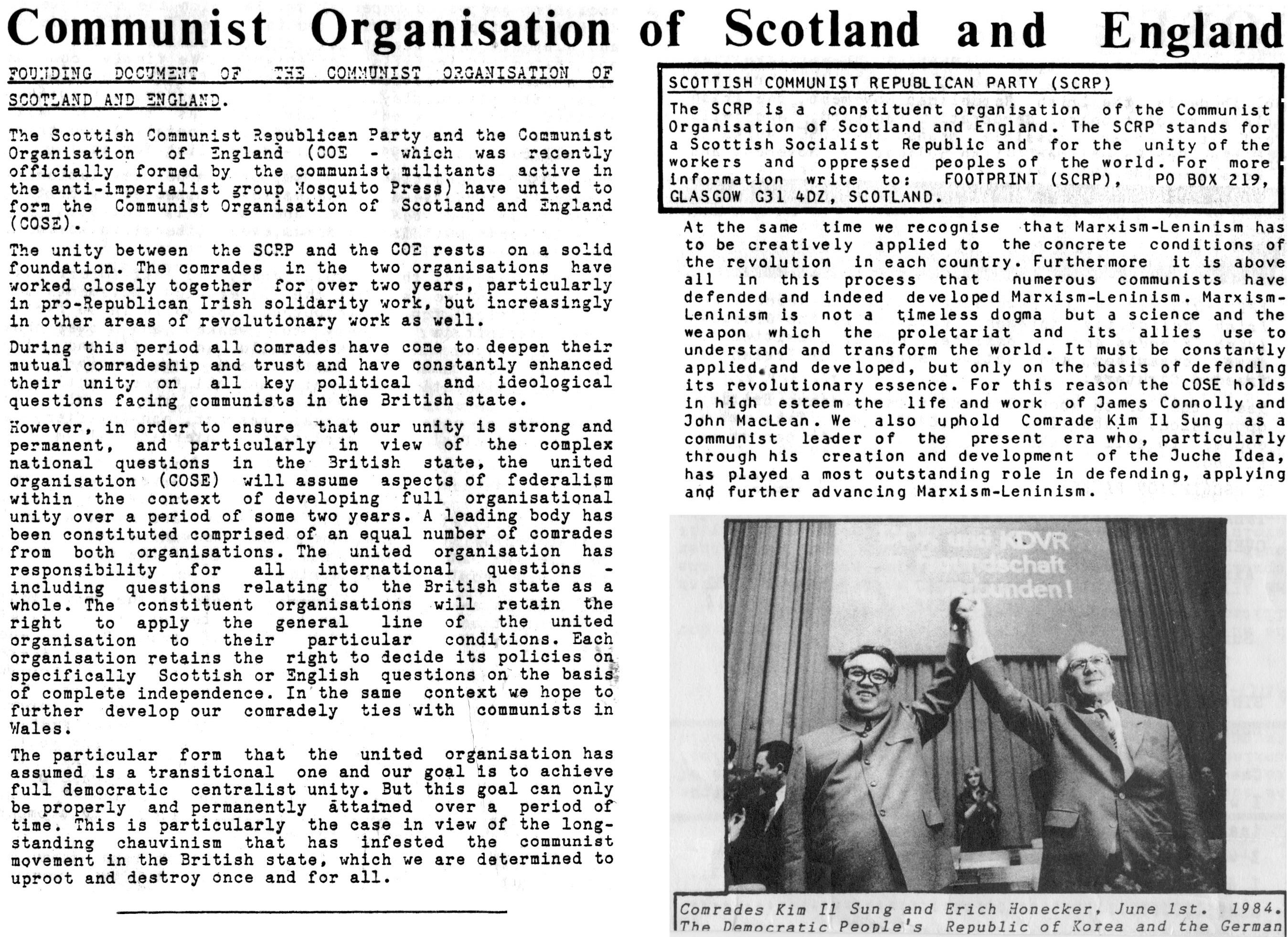
In September 1983, the faction broke away from the RCLB under the auspicious of the Mosquito Press. Initially, Mosquito Press functioned primarily as a vehicle for the political analyses of ’Stephens,’ its director, publishing his attacks upon both the Revolutionary Communist Group (RCG), with whom the RCLB was working on Irish Solidarity activities, and upon his political opponents within the RCLB, on whom he attached the label of ’Orange faction’. ’Stephens’ also was active as secretary (and often the sole member) of the London-based Institute for Independence Studies and later in the Campaign Against Sanctions and War on Iraq, acting as Co-ordinator to the International Commission of Inquiry on Economic Sanctions.
Organizationally, Mosquito Press worked with a group based in Scotland that was also critical of the RCG and which formed a minscule organisation called the Scottish Communist Republican Party (SCRP). The ’communist militants ’ within the Mosquito Press formed themselves into the Communist Organization of England (COE) and claimed to be the ’English component’ of the Communist Organisation of Scotland and England (COSE), with the SCRP being the other component. COSE declared its political identity with North Korea and Mosquito Press distributed the English-language editions of the writings of Kim Il Sung as well as published Korean Outlook ’to promote friendship for Korea and solidarity with Korean reunification.’
COSE did not survive long – within 18 months there was a breakdown in relations between ’Hugh Stephens’ and ’Keith Anderson’, and the dissolution of the alliance between COE and the SCRP. Then the ’single member’ COE renamed itself the Communist Organisation of Britain. This ’organization’ did not have a politically active existence and soon faded from the scene.
There Is A Way Foward – Let Us Take It!
Founding Document of the Communist Organisation of Scotland and England
Ireland Solidarity. Towards A Programme
Ireland and British Revolutionary History: A New Interpretation
Statement to November 20, 1982 Conference [on Irish Solidarity]
Commemorating Comrade Kim Il Sung
[Back to top]
The Revolutionary Internationalist Contingent in Britain was the UK affiliate of an international project initiated by the Revolutionary Communist Party, USA called the Revolutionary Internationalist Movement (RIM). When RIM announced its existence in March 1984, two local English groups were signatories on its Declaration: The Nottingham Communist Group (NSG) and the Stockport Communist Group. These two organizations had previously been involved in a joint party building effort through their proposals for a Marxist-Leninist Programme Commission [MLPC]. Formally set up in the summer of 1982, the effort never reality got off the ground.
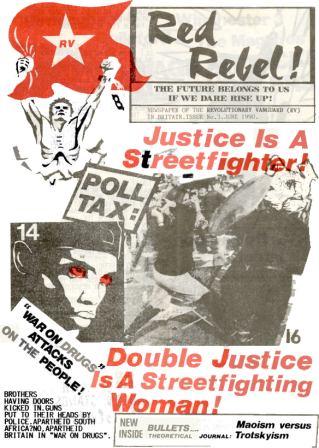
In 1986, the two groups reconstituted themselves as the Revolutionary Internationalist Contingent in Britain (RIC) – a pre-party organisation – on the basis of a published programmatic document, Break The Chains! Manifesto of the RIC. It was described by ’Harry Powell’, NCG’s leading (and eventually only) member, as a theoretical advance over anything previously produced by Maoists in Britain. In 1987, a bulletin of the RIC , ’The Rebel’, was launched.
The RIC had a London-based counter-part, consisting largely of exiled militants of the Iranian Sarbedaran organisation, supported by a sprinkling of students. As a combined force, they number around twenty. The characteristics they shared, besides an adherence to RIM, was an uncritical promotion of the Cultural Revolution and solidarity with the revolutionary struggle of the Communist Party of Peru, commonly referred to as ’Sendero Luminoso – the Shining Path’.
Unity between the RIC and the London group proved difficult to maintain. The Nottingham-based remnant was unable to cement organisational/programmatic unity with the London-based comrades, and it split in mid-1987. According to Powell, the split occurred, partly because the London group, “had never grasped or agreed with the project of the Marxist-Leninist Programme Commission. Their approach to party-building was empiricist, i.e. one simply formed a group and plunged into political activity”
There followed a period of confusion. The London group, presenting itself as “Supporters of the RIM in Britain”, began producing a journal, ’Conqueror the World’ in 1988, that saw 13 issues (at least by December 1991). At the same time, the organisation, largely Iranian in composition, was renamed, in the spring of 1991 the Revolutionary Communist Maoists (RCM).
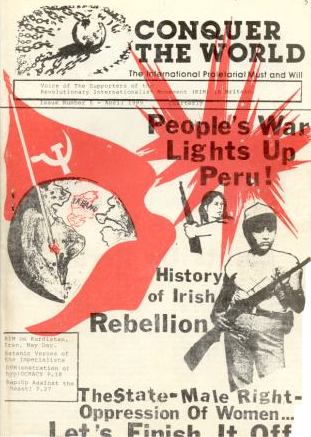
A splinter, seemingly based in the Kurdish struggle, emerged in 1989. Calling itself ’the Revolutionary Vanguard in Britain,’ it produced Red Rebel, (six issues at least appeared during 1990/91) which had a limited circulation.
Former allies, no longer publically identified as the RCM, established the World People’s Resistance Movement (Britain) in June 2002 ”with a meeting of people from different nations and nationalities including Turkish, Kurdish, Iranian, English, African and Latin American people from London.” (They have an internet presence: http://www.wprm.org/index2.html.) Initially, the group’s politics favoured the concerns associated with the Revolutionary Internationalist Movement; however, the local WPRM group followed an independent line after criticising the RCP,USA on its position in relation to the struggle in Nepal and its promotion of Bob Avakian’s “New Synthesis.” It is questionable how far the WPRM is engaged in party-building activities as distinct from being a broad front of pro-Maoist solidarity activists.
Break the Chains! Manifesto of the Revolutionary Internationalist Contingent in Britain
We Are All Illegals – We Are Proletarians – We Have No Country – We Have A World To Win
Ireland: National Liberation Struggle or Socialist Revolution?
Support the Irish People’s Struggle Against British Imperialism
Move Heaven and Earth to Defend the Life of Chairman Gonzalo by the Revolutionary Communist Maoists of Britain
Maoism and the Two Line Struggle within the Revolutionary Internationalist Movement (RIM)
Britain 2009 by the World People’s Resistance Movement (Britain)
On Vicious attacks against the Revolution in Nepal by the World People’s Resistance Movement (Britain)
The Criterion of Truth by the World People’s Resistance Movement (Britain)
[Back to top]
Beginning in 2009, the London based Co-ordination Committee of Revolutionary Communists of Britain has sought to co-ordinate the remaining Maoist and anti-revisionist groups in the UK. It declared that it had “embarked on the preparatory stage of party building” and the development of a Maoist revolutionary strategy to pursue in the context of a European Imperialist country.
In practice, however, the Coordination Committee proved to be a loose association of three organisations – Democracy and Class Struggle, the George Jackson Socialist League, and Revolutionary Praxis – advertising and supporting each other’s activities.
Democracy and Class Struggle [DCS]: The largely internet-active Democracy and Class Struggle which has been maintained by a veteran member of the Indian Workers Association, notably concentrates on events in and around the Indian sub-continent. The legacy of Maoism it has defended is the radical impulse of ’People’s War’ and Kumar Sakar through Second Wave Publications-distributed material in support of People’s War in India and Nepal. It has also taken the position that it is “essential to understand the capitalist character of contemporary China” as expressed by ’Nickglais’ of Democracy and Class Struggle to a meeting in Conway Hall London in October 2008 organised by Second Wave Publications.
DCS has criticized the RCP, USA for its opposition to the Maoist leadership in Nepal. It also condemned developments within the American organisation for what it saw as the rejection of Maoism and its replacement by Avakianism. More recently, DCS has also rejected what it describes as Prachanda's Neo-Revisionism.
George Jackson Socialist League: A Maoist group within the Black Community in London, the George Jackson Socialist League of Tongogara Otewodros maintains a public presence for Maoism, organising public meetings of commemoration, such as those for George Jackson and Claudia Jones, and agitational campaign meetings, in particular around the case of the imprisoned Black American radical journalist, Mumia Abu-Jamal.
Revolutionary Praxis: Harry Powell, formerly of the Nottingham Communist Group, maintains periodic online commentaries under the name of Revolutionary Praxis, having earlier politically flirted with the Stalin Society and engaged with the process that saw the formation of the miniscule Communist Party Alliance.
The political practice of Revolutionary Praxis reflects an assessment that experience has shown that a Maoist revolutionary organization in Britain cannot emerge from international solidarity work alone, that building a revolutionary movement in Britain, “will not be done by small, closed meetings in London to debate the correctness or otherwise of the line of the UCPN(M) or the validity of the Thoughts of Chairman Bob.”
In an 2009 article Powell raised the question ’Is this the End – Maoism in Britain’ and failed to come up with any hopeful conclusions. Under the advertised title of “The Present International and National Situations and the Tasks of Creating a Revolutionary Communist Party in Britain” he had previously attempted to rally Maoist forces in the UK with a joint meeting under the auspices of the Co-Ordination Committee of Revolutionary Communists of Britain in December 2008 addressed by a Norwegian Maoist, Kenneth Fuglemsmoen of Tjen Folket (Serve the People). It failed to coalesce the remaining Maoist veterans into a pre-party organisation.
* * *
The continuing political and ideological differences among organised Maoists in Britain can be seen in Powell’s response to an article, The Criterion of Truth, by former allies in the World People’s Resistance Movement. A one-time fellow RCP, USA supporter, Powell criticised WPRM for its “undialectical and idealist” assessment of the organisation they had once both looked to for political guidance. Yet he also concurred in dismissing “idealist tendencies [that] have now become manifest in putting forward Bob Avakian’s “New Synthesis” – not a product of the practice of the RCP but Bob’s own unique creation – as the answer to the problems of the ICM.”
The creation and continuation of the Co-ordination Committee of Revolutionary Communists of Britain is less evidence of the re-birth of British Maoism than a testimony to the fidelity of a few long-time activists. Its co-ordination of solidarity statements, embassy pickets and small organisational activities keeps a Maoist flame flickering in Britain, but the marginal existence of the pre-party building grouplets that compose it demonstrates the waning influence that a previously vibrant movement once expressed.
Obituary to Ross Longhurst aka ‘Harry Powell’
Marxist-Leninist Revolutionary Organization in Britain by Harry Powell
Maoism in Britain – Is this the End? by Harry Powell
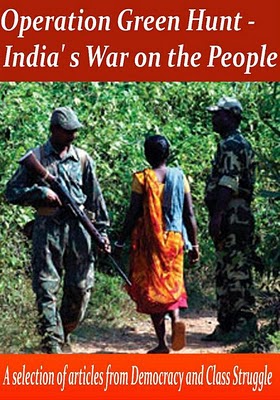
On Harry Powell’s paper – Is this the End – Maoism in Britain by Paolo Babini, Party of the Committees to Support Resistance – for Communism (CARC-Italy)
For a New World: Manifesto of Revolutionary Praxis
Revolutionary Praxis: Notes on International Communist Policy 1935 to 1941
Chinese Communist Critiques of Soviet Society by Harry Powell
Is a Revolutionary Movement Possible in an Imperialist Country Today? by Harry Powell
Mao Tse-Tung: Revisionist or Revolutionary? by Harry Powell
On the Necessity of Revolutionary Violence
Contemporary China – What is its social character: is it capitalist or is it socialist?
Operation Green Hunt – India’s War on the People A Selection of Articles from Democracy and Class Struggle
Computers, Capitalism and Socialism by Harry Powell
Can Capitalism Go Green? by Harry Powell
Outbreak of Election Fever by Harry Powell
If Voting Changed Anything... by Harry Powell
British General Election – Don’t Vote – Organise and Fight Back by the Co-ordination Committee of the Revolutionary Communists of Britain
What Use Are the Unions? by Revolutionary Praxis
William Morris: Visionary Communist by Revolutionary Praxis
[Back to top]